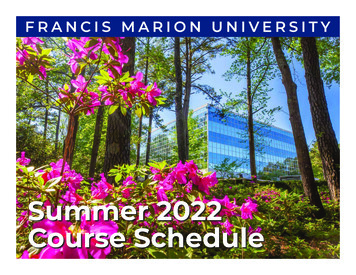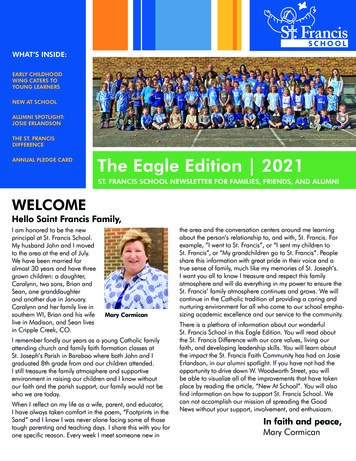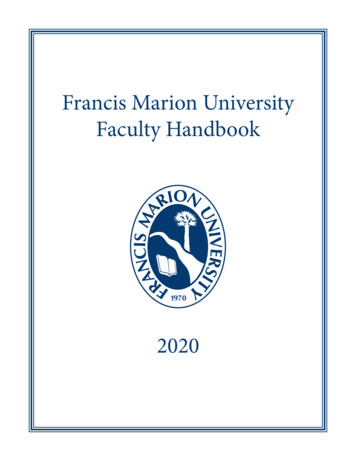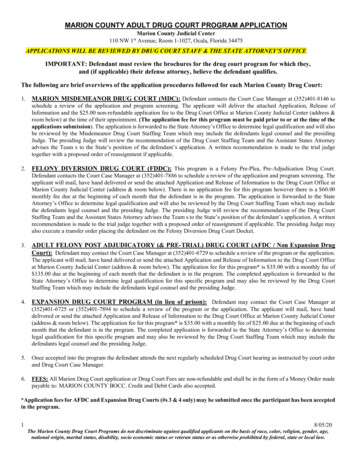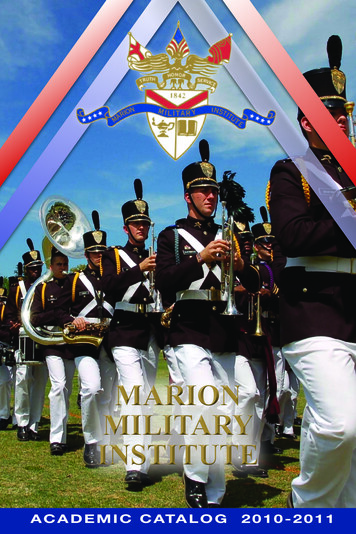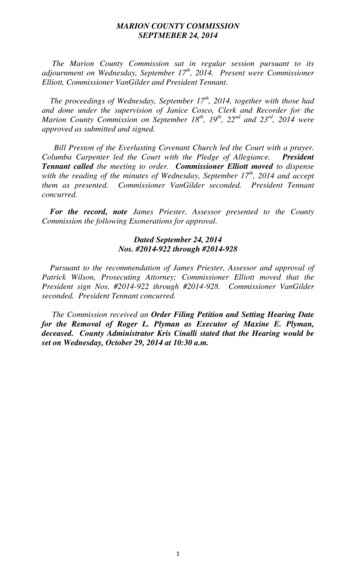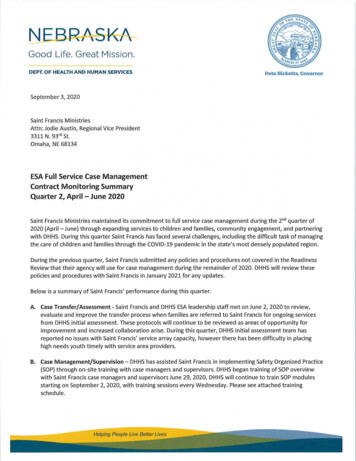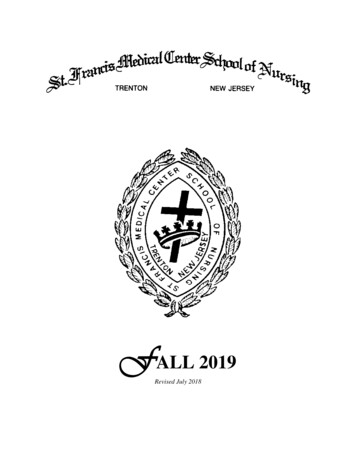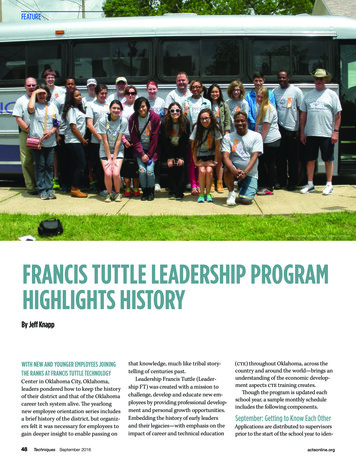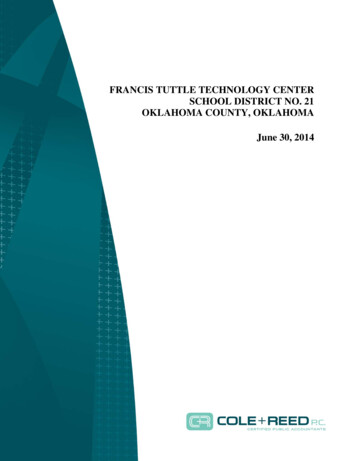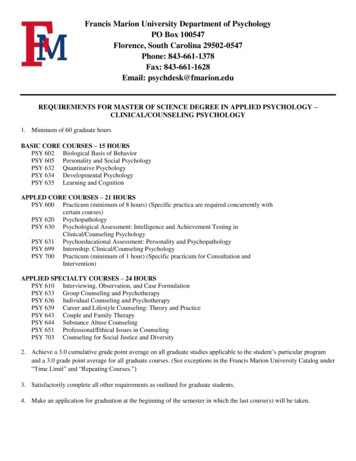
Transcription
Francis Marion University Department of PsychologyPO Box 100547Florence, South Carolina 29502-0547Phone: 843-661-1378Fax: 843-661-1628Email: psychdesk@fmarion.eduREQUIREMENTS FOR MASTER OF SCIENCE DEGREE IN APPLIED PSYCHOLOGY –CLINICAL/COUNSELING PSYCHOLOGY1. Minimum of 60 graduate hoursBASIC CORE COURSES – 15 HOURSPSY 602 Biological Basis of BehaviorPSY 605 Personality and Social PsychologyPSY 632 Quantitative PsychologyPSY 634 Developmental PsychologyPSY 635 Learning and CognitionAPPLED CORE COURSES – 21 HOURSPSY 600 Practicum (minimum of 8 hours) (Specific practica are required concurrently withcertain courses)PSY 620 PsychopathologyPSY 630 Psychological Assessment: Intelligence and Achievement Testing inClinical/Counseling PsychologyPSY 631 Psychoeducational Assessment: Personality and PsychopathologyPSY 699 Internship: Clinical/Counseling PsychologyPSY 700 Practicum (minimum of 1 hour) (Specific practicum for Consultation andIntervention)APPLIED SPECIALTY COURSES – 24 HOURSPSY 610 Interviewing, Observation, and Case FormulationPSY 633 Group Counseling and PsychotherapyPSY 636 Individual Counseling and PsychotherapyPSY 639 Career and Lifestyle Counseling: Theory and PracticePSY 643 Couple and Family TherapyPSY 644 Substance Abuse CounselingPSY 651 Professional/Ethical Issues in CounselingPSY 703 Counseling for Social Justice and Diversity2. Achieve a 3.0 cumulative grade point average on all graduate studies applicable to the student’s particular programand a 3.0 grade point average for all graduate courses. (See exceptions in the Francis Marion University Catalog under“Time Limit” and “Repeating Courses.”)3. Satisfactorily complete all other requirements as outlined for graduate students.4. Make an application for graduation at the beginning of the semester in which the last course(s) will be taken.
CLINICAL/COUNSELING COURSE DESCRIPTIONS600A Professional Psychology Practicum (1) F, S, SU. This practicum serves two purposes: 1) All school psychology students mustcomplete an Introduction to the Schools Practicum during the fall semester of their first year of study. This practicum involvesshadowing a practicing school psychologist and participating in various activities related to school psychology, school organizationand operation. 2) Any master’s degree student in psychology may work with a psychology faculty member to develop a fieldexperience involving research or practice which is relevant to their program of study.600B Psychological Assessment Practicum (1) F, S, SU. Students enrolled in PSY 606, PSY 616, PSY 630, PSY 631, and PSY 639must be enrolled concurrently in this practicum. This practicum involves administration, scoring, interpretation, and reporting ofresults of psychological testing instruments and other assessment procedures relevant to the specific course to which the practicum isattached. Students may be assigned to psychoeducational, counseling and/or mental health centers for this experience. A minimum of50 clock hours is required per practicum.600C Psychological Intervention Practicum (1) F, S, SU. Students enrolled in PSY 604, PSY 610, PSY 633, PSY 636, PSY 643,and PSY 644 must be enrolled concurrently in this practicum. This practicum involves interviewing, observation, clinical problemsolving, treatment planning and intervention development, individual therapy, group therapy, direct intervention, and indirectintervention/ consultation experiences relevant to the specific course to which the practicum is attached. Students may be assigned topsychoeducational, counseling and/or mental health centers for this experience. A minimum of 50 clock hours is required perpracticum.602 Biological Basis of Behavior (3) F. Survey of basic neuroanatomy and physiology of the nervous system. Emphasis on ways inwhich the environment affects behavior via the nervous system. Current research relevant to biological basis of behavior is reviewed.605 Personality and Social Psychology (3) SU. Survey of the basic areas of personality and social psychology with coverage ofcontemporary research issues in social psychology as well as the classic theories of personality.610 Interviewing, Observation, and Case Formulation (3) F. Introduction to fundamental skills used in clinical/counselinginterviews, including interview and observation techniques used for clinical data gathering. Particular emphasis is on caseconceptualization to inform treatment planning, case report writing, and basic counseling techniques. Particular attention is also givento ethical and professional issues in counseling. Students must be concurrently enrolled in Psychology 600C, PsychologicalIntervention Practicum.620 Psychopathology (3) S. Survey of the history and classification of mental disorders with emphasis on models ofpsychopathology. Includes a review of contemporary diagnostic practices, and development of diagnostic skills using the DSMClassification System.630 Psychological Assessment: Intelligence and Achievement Testing in Clinical/Counseling Psychology (3) (Prerequisite: PSY610) S. Review of measurement statistics and psychometric theory, and examination of the most frequently used intelligence, adaptivebehavior, and achievement tests in clinical/counseling psychology. Skill development in test administration, scoring, and interpretationof test results, as well as psychological report writing and diagnostic skills. Skill development in giving assessment results andfeedback to clients. Examination of cultural diversity, ethical issues, and technology as they pertain to assessment. Students must beconcurrently enrolled in Psychology 600B, Psychological Assessment Practicum.631 Psychological Assessment: Personality and Psychopathology (3) (Prerequisite 610, 630) S. Examination of psychometrictechniques applied to the assessment of personality and psychopathology. Includes skill development in the diagnostics ofpsychopathology. Students must be concurrently enrolled in Psychology 600B, Psychological Assessment Practicum.632 Quantitative Psychology (3) (Prerequisite: 302 or equivalent) S. Basic course in data presentation and analysis. Includesdescriptive statistics, correlation, and regression, as well as inferential statistics. Emphasis on matching appropriate statistics toexperimental design and psychometric theory.633 Group Counseling and Psychotherapy (3) (Prerequisite: 610) F. Explores the theory, process, and practice of group therapy/counseling. Includes the stages of group therapy, various group techniques, and how to deal with problem situations that can arise ingroup therapy. May also include how to conduct special groups such as pain management, stress management, and assertivenessgroups. Must be concurrently enrolled in Psychology 600C, Psychological Intervention Practicum.634 Developmental Psychology (3) SU. Survey of current topics and research methods in life span developmental psychology.Implications of research results to community-based interventions with children, adolescents, and the aged.635 Learning and Cognition (3) SU. Review of traditional topics in learning as well as topics of current interest in cognition.Selection of topics from perception, attention, memory, thinking, and language. Functional disorders of memory and language.
636 Individual Counseling and Psychotherapy (3) (Prerequisite: 610; corequisite: 630) S. Survey of theoretical foundations andtechniques of individual counseling and psychotherapy with an emphasis on empirically supported models of psychotherapy,including cognitive-behavioral therapy. The course will provide the student with the opportunity to develop skills in the techniquescovered. Attention also will be given to ethical and professional issues in the practice of therapy, as well as issues pertaining to socialand cultural diversity. Must be concurrently enrolled in Psychology 600C, Psychological Intervention Practicum.639 Career and Lifestyle Counseling: Theory and Practice (3) (Prerequisite: 610, 630) F. An introduction to career developmenttheory, psychological assessment for career planning and sources and uses of career and lifestyle information in counseling. Must beconcurrently enrolled in Psychology 600B, Psychology Assessment Practicum.643 Couple and Family Therapy (3) (Prerequisite: 610) S. Overview of theoretical assumptions and concomitant assessment andtreatment strategies associated with the major models of couple and family therapy, including cognitive-behavioral, Bowenian/familysystems, object relations/psychodynamic, structural, and strategic. Examination of cultural diversity and ethical/professional issues inclinical work with couples and families. Must be concurrently enrolled in Psychology 600-C, Psychological Intervention Practicum.644 Substance Abuse Counseling (3) S. A seminar course that covers major content areas relevant to substance abuse counseling.These include the diagnostics and psychopathology of substance abuse and the clinical assessment of drug and alcohol dependency.The course also covers major models of substance abuse treatment, as well as specific counseling skills for this clinical population.Additional coverage includes the needs of special populations (e.g., women, adolescents, dual-diagnosed). Students must beconcurrently enrolled in Psychology 600A, Professional Psychology Practicum.651 Professional/Ethical Issues in Counseling Psychology (3) SU. This course might begin with a review of models or influencesaffecting the practice of counseling psychology along with professional organizations. Issues and ethical conflicts addressed wouldinclude client rights and confidentiality, dual relationships, proper use of assessment, ethical concerns that arise in various forms ofcounseling or with special populations, and professional competence and continuing education. Other professional topics to beaddressed include supervision and professional relationships in the community, malpractice and legal issues, multicultural concerns,and personal values and awareness including the issue of distress and impairment. In addition to reading and discussion, students willanalyze case dilemmas and research areas of professional interest.699-A Internship: Clinical/Counseling Psychology (3) (Prerequisite: Permission of department) F, S, SU. A practical experienceutilizing applied skills with a diversity of problems in a clinical/counseling setting. The many roles of a psychologist are performed inaccordance with accepted legal and ethical standards of the profession.700C Advanced Psychological Consultation/Intervention Practicum (1) S. Students enrolled in PSY 703 must be enrolledconcurrently in this practicum. This practicum involves advanced knowledge and skills in interviewing, observation, clinical problemsolving, treatment planning and intervention development, individual therapy, group therapy, direct intervention, and indirectintervention/ consultation experiences relevant to the specific course to which the practicum is attached. Students may be assigned topsychoeducational, counseling and/or mental health centers for this experience. Organization development and evaluation activitiesalso are emphasized. A minimum of 50 clock hours is required per practicum.703 Counseling for Social Justice and Diversity (3). This course is designed to expand the student’s awareness of both the cognitiveknowledge and skills necessary to effectively interact with and serve culturally diverse populations. There is an emphasis on attitudesand competencies that are important in effective professional relationships. Though the course is not exhaustive in its discussion ofdiverse populations, it will focus on cultural diversity and those populations who are more likely to be encountered by the studentstaking the course. This course will examine racial and ethnic identity as well as acculturation status. It will also examine how issues ofindividual and institutional racism and oppression continues to play out in the mental health of those served.
Master of Science in Applied PsychologyClinical/Counseling Psychology Option Model ProgramSpring EntryFIRST YEARSPRING TERM (6 hours)PSY 620PSY 632PsychopathologyQuantitative Psychology(3)(3)SUMMER TERM (9 hours)PSY 605PSY 634PSY 635Personality and Social Psychology (Summer II)Developmental Psychology (Summer I)Learning and Cognition (Summer II)(3)(3)(3)Substance Abuse CounselingProfessional Psychology PracticumInterviewing, Observation, and Case FormulationPracticum: Intervention(3)(1)(3)(1)Psychological Assessment: Intelligence and Achievement Testing inClinical/Counseling PsychologyPracticum: AssessmentIndividual Counseling and PsychotherapyPracticum: Intervention(3)SECOND YEARFALL TERM (8 hours)PSY 644PSY 600APSY 610PSY 600CSPRING TERM (8 hours)PSY 630PSY 600BPSY 636PSY 600C(1)(3)(1)SUMMER TERM (7 hours)PSY 651PSY 700CPSY 703Professional/Ethical Issues of Counseling Psychology (Summer I)Practicum: Consultation/Intervention (Summer II)Counseling for Social Justice and Diversity (Summer II)(3)(1)(3)Biological Basis of BehaviorCareer and Lifestyle Counseling: Theory and PracticePracticum: AssessmentCouple and Family TherapyPracticum: Intervention(3)(3)(1)(3)(1)Psychological Assessment of Personality and PsychopathologyPracticum: AssessmentGroup Counseling and PsychotherapyPracticum: Intervention(3)(1)(3)(1)THIRD YEARFALL TERM (11 hours)PSY 602PSY 639PSY 600BPSY 643PSY 600CSPRING TERM (8 hours)PSY 631PSY 600BPSY 633PSY 600CSUMMER TERM (3 hours)PSY 699AInternship: Clinical/Counseling PsychologyTOTAL PROGRAM HOURS:(3)60NOTES:*PSY 610 is a prerequisite to PSY 630, 633, and 643.*PSY 610 and PSY 630 are prerequisites to PSY 631 and 639*PSY 610 is a prerequisite and PSY 630 a corequisite to PSY 636.revised 4.12.2016
Master of Science in Applied PsychologyClinical/Counseling Psychology Option Model ProgramFall EntryFIRST YEARFALL TERM (8 hours)PSY 600APSY 644PSY 600CPSY 610Professional Psychology PracticumSubstance Abuse CounselingPracticum: InterventionInterviewing, Observation, and Case Formulation(1)(3)(1)(3)SPRING TERM (11 hours)PSY 620PSY 630PSY 600BPSY 636PSY 600CPsychopathologyPsychological Assessment: Intelligence and Achievement Testing inClinical/Counseling PsychologyPracticum: AssessmentIndividual Counseling and PsychotherapyPracticum: Intervention(3)(3)(1)(3)(1)SUMMER TERM (9 hours)PSY 605PSY 634PSY 635Personality and Social Psychology (Summer I)Developmental Psychology (Summer I)Learning and Cognition (Summer II)(3)(3)(3)Biological Basis of BehaviorCareer and Lifestyle Counseling: Theory and PracticePracticum: AssessmentCouple and Family TherapyPracticum: Intervention(3)(3)(1)(3)(1)SECOND YEARFALL TERM (11 hours)PSY 602PSY 639PSY 600BPSY 643PSY 600CSPRING TERM (11 hours)PSY 631PSY 600BPSY 632PSY 633PSY 600CPsychological Assessment of Personality and PsychopathologyPracticum: AssessmentQuantitative PsychologyGroup Counseling and PsychotherapyPracticum: Intervention(3)(1)(3)(3)(1)SUMMER TERM (7 hours)PSY 651PSY 700CPSY 703Professional/Ethical Issues of Counseling Psychology (Summer I)Practicum: Consultation/Intervention (Summer II)Counseling for Social Justice and Diversity (Summer II)(3)(1)(3)Internship: Clinical Psychology(3)THIRD YEARFALL TERM (3 hours)PSY 699ATOTAL PROGRAM HOURS:60NOTES:*PSY 610 is a prerequisite to PSY 630, 633, and 643.*PSY 610 and PSY 630 are prerequisites to PSY 631 and 639*PSY 610 is a prerequisite and PSY 630 a corequisite to PSY 636.revised 4.12.2016
PSY 644 Substance Abuse Counseling PSY 651 Professional/Ethical Issues in Counseling PSY 703 Counseling for Social Justice and Diversity 2. Achieve a 3.0 cumulative grade point average on all graduate studies applicable to the student's particular program . 639 Career and Lifestyle Counseling: Theory and Practice (3) (Prerequisite: 610, 630 .
